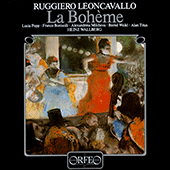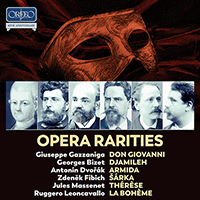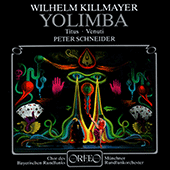Alan Titus
Alan Titus was born in New York and studied singing at the famous Juilliard School. As a student, he already sang the main part in Bernstein’s Mass at the opening of the Kennedy Center in Washington D.C., conducted by the composer himself.
His début in the part of Marcello in La Bohéme at the Washington Opera was followed by important parts in the Italian, French and German Fach, with guest performances at all the major opera houses in the United States: San Francisco, Chicago Lyric Opera and his début at the Metropolitan Opera New York conducted by James Levine in parts like Papageno (Die Zauberflöte), Harlekin (Ariadne Auf Naxos) and Eisenstein (Die Fledermaus), Posa (Don Carlo), Ford (Falstaff), with conductors such as John Pritchard, Christoph von Dohnányi, James Levine, Lorin Maazel and Sergiu Celebidache.
Since 1974, the year of his European début in the part of Pelleas (Pelleas et Melisande) in Amsterdam, Alan Titus has been giving regular and frequent guest performances in Europe (Glyndebourne Festival: Guglielmo (Così) and Graf (Figaro)). From the ’80s onwards, he has been focusing on parts like that of Golo in Pelleas et Melisande in Nizza, the Nase (title part) in Frankfurt, Valentin (Faust) with Giuseppe Patanè, etc.
In 1986, Alan Titus became a permanent guest at the Staatsoper in Munich, where Wolfgang Sawallisch greatly influenced the singer’s artistic career and development and, over the next six years, successfully led Alan Titus to new parts and, in 1992, encouraging him to explore a new Fach: Don Giovanni (Don Giovanni), Olivier (Capriccio), Guglielmo (Così), Figaro and Graf (Figaros Hochzeit) and Cardillac (Cardillac), Mandryka (Arabella) (at a guest performance of the Staatsoper Munich at the Scala in Milan = rôle début in 1991) Barak (Frau Ohne Schatten) at the Japan tour of the Staatsoper Munich in 1992, and from then on regularly in Munich, at a later point also with Horst Stein.
Since 1985, Alan Titus has also been returning regularly to the Staatsoper Hamburg with the major rôles of his repertoire, and went on a tour of Japan with the ensemble in 1994.
Over the years, he has also had numerous engagements at all leading European opera houses: he made his début at the Scala in Milan in the rôle of Mandryka (Arabella) in 1992, conducted by Wolfgang Sawallisch, sang at the Wiener Staatsoper in the part of Guglielmo (Così) with Nicolaus Harnoncourt and was the Graf (Figaro) with Leopold Hager in 1988 and 1989, in Paris he again sang the Graf (Figaro) and Eisenstein (Fledermaus) in 1983, the rôle of Marcello (Bohéme) in 1985, and in Barcelona he was Don Giovanni. Alan Titus has since been a regular guest in all these opera houses.
The part of Orest in the new production of Elektra at the Scala in Milan in 1994 constitutes the beginning of his close working relationship with Giuseppe Sinopoli. With Giuseppe Sinopoli, Alan Titus made his début as Jack Rance (Fanciulla) at a guest performance of the Scala in Milan in Japan 1995, appeared in Frau Ohne Schatten again at the Scala in 1999, sang the Brahms requiem in Dresden on February 13, 1995, in remembrance of the bombardment of Dresden 50 years ago, and sang the part of Wotan (Walküre) in concerts at the Opera die Roma in February 1999. For the time being, the highlight of this artistically outstanding and, for Alan Titus, extremely formative working relationship is going to be the “Millennium-RING” at the Bayreuth Festival in 2000, where Alan Titus is going to make his début in three parts: Wotan (Rheingold), Wotan (Walküre), and Wanderer (Siegfried).
Alan Titus has also sung in numerous concerts: Brahms’s Requiem and Fauré’s Requiem with Sergio Celibidache, Bach’s Matthäus-Passion with Zubin Mehta, Schöpfung with H.M. Schneidt, Haydn’s Jahreszeiten with Bernhard Haitink, Elias with Wolfgang Sawallisch.
With his part as Barak (Frau Ohne Schatten) at the guest performance in Japan with the Staatsoper Munich in 1992 and that of Hans Sachs (Meistersinger) in Frankfurt in 1993—a début that was considered outstanding both in Germany and abroad—Alan Titus proved that he had changed into a true Helden baritone.
His next parts were those of Wotan + Wanderer (in concerto version), Kurwenal, Holländer and the Italian parts of Jago, Macbeth und Falstaff. For the latter part, Alan Titus was voted “singer of the year 1997” by the “Opernwelt” magazine. He was also awarded a prize for his interpretation of Macbeth, conducted by Robert Carson, in Cologne in 1998.
Of his numerous records, the following titles deserve special mention: Don Giovanni/Rafael Kubelík, Figaros Hochzeit and Falstaff conducted by Sir Colin Davis, La Wally with the RCA, or Beethoven’s 9th Symphony conducted by Michael Gielen and by Giuseppe Sinopoli in 1997. In summer 1999, Alan Titus sang the part of Pizarro in the recording of Fidelio (Naxos).
In 1994, Alan Titus was awarded the title of “Kammersänger der Bayerischen Staatsoper München”.
For Naxos, Alan Titus’s voice has been recorded in Great Operatic Arias for Baritone released in April 2002.




















